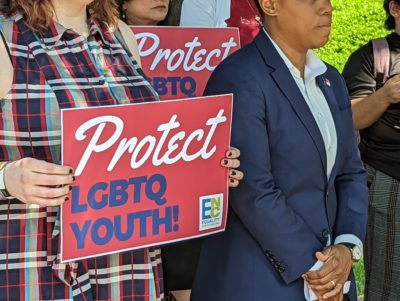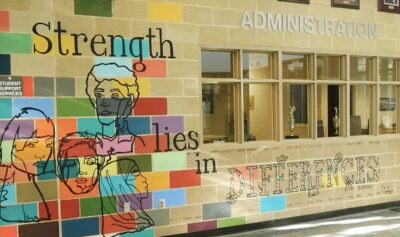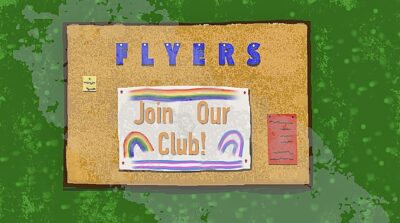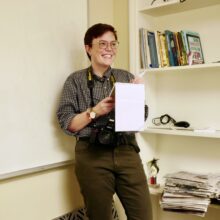
|
|
“Why do I feel so out of place? I just feel so weird.”
That’s what Chloe Ripoli said was going through their mind at the beginning of the pandemic during quarantine.
Their identity was starting to come to the surface.
Ripoli, now a high school senior, is queer and nonbinary. On top of a challenging course load filled with Advanced Placement courses and community college classes, they serve as president of their school’s Gender and Sexualities Alliance (GSA), which functions as a safe gathering space for LGBTQ+ students and allies and also provides events for the school community.
Sign up for the EdWeekly, a Friday roundup of the most important education news of the week.
The GSA and its faculty advisor help Ripoli and other students feel uplifted and secure in their queer identities.
“It makes me feel at home, and I know that a lot of other students in the GSA feel the same way,” Ripoli said.
Ripoli said they begin and end most school days the same way: visiting and chatting with their GSA’s faculty advisor, who they call a “second mom.”
“My mom doesn’t really like when I say that,” Ripoli said with a laugh.
Ripoli said they first realized they were queer in middle school. They didn’t have a lot of LGBTQ+ representation growing up, and when their uncle, who is close to their age, came out as gay, they were confused.
“I was like, ‘What is that? What does that mean? I have no idea what that is,’” Ripoli said.
Ripoli said their uncle then showed them the hit musical show “Glee,” which features LGBTQ+ characters and story lines.
“I had all these questions,” they said.
Their uncle also introduced them to queer British Youtubers Dan and Phil, a duo featuring Daniel Howell and Phil Lester.
Ripoli said over time, “one thing led to another” and they realized that they, too, were queer.
Ripoli said their identity received very “mixed” reactions from people at their school, including some students who would negatively target them and their queer peers. But having a supportive faculty advisor and an inclusive, welcoming club like a GSA helps Ripoli focus more on their academics rather than repressing who they are, they said.
“If I didn’t have that, then I would be a lot more focused on tampering down my queerness and making it watered down,” Ripoli said. “And I’d be more focused on that than actually doing what I’m supposed to be doing at school, but because I have that safety and that sense of community, I have been able to excel in different areas of life.”
The Trevor Project, a nonprofit group that provides crisis counseling for and advocates for the mental health of LGBTQ+ young people, released its 2024 U.S. National Survey on the Mental Health of LGBTQ+ Young People earlier this year. The survey showed that 12% of LGBTQ+ young people attempted suicide last year. However, transgender and nonbinary young people who reported that their school was gender-affirming reported lower rates of suicide attempts.
Sara Toothman, educator and faculty advisor for an LGBTQ+ organization at a school, said you can see students’ “shoulders drop” when they feel supported in their identities, and this lesser degree of stress helps them focus on other things.
“I think they know they’re safe,” Toothman said. “They can focus on those other things that make them weird, or those other things that make them energized, or academically challenged or whatever. So it’s nice that they don’t have to spend 20 to 30% of their brain power just trying to contain it. They can just let it be.”
GSAs are student organizations that provide LGBTQ+ students and allies the chance to build community, learn about queer topics, advocate for LGBTQ+ issues, and more.
Ripoli’s GSA hosts a week-long event for their school in April called Awareness Week, which celebrates various cultures, identities, and mental health awareness. Awareness Week ended with the Day of Silence.
Toothman’s organization, called A-OK, functions as a pride group and as a social and community building space for LGBTQ+ students and their allies.
Ripoli said their GSA provides security for students, but after Senate Bill 49, known as “The Parents’ Bill of Rights,” their school atmosphere felt “tangibly different.”
“At the beginning of the school year, especially, I had a lot of members of GSA messaging me and being like, ‘Hey, are we safe? Is something going to happen? Are we okay?’ And it really just hurt me that they felt like they had to ask that,” Ripoli said.
The North Carolina legislature passed SB 49 last year after overriding a veto from Gov. Roy Cooper. The bill, now law, requires school officials to inform parents if their student tells personnel they wish to change their name or pronouns, and bans instruction on gender and sexuality in kindergarten through fourth grade.
The bill, among other things, also allows parents to review textbooks and supplemental materials in their student’s school, and requires schools to provide parents “notice of changes in services or monitoring” in regards to their child’s physical, mental, or emotional health.
Those opposed to the bill, like the LGBTQ+ rights organization Equality NC, criticize the bill for erasing queer topics from instruction, potentially outing students, and putting them at risk while placing extra pressure on school employees.
Supporters of SB 49, such as Sen. Amy Galey, R-Alamance, say it keeps instruction “age-appropriate” and allows parents better access to what happens at their children’s school.
“It increases accessibility to what’s being taught in our schools, notifies parents of the well-being of their children, and keeps school curriculum focused on core subjects,” Galey said in a release on Aug. 16, 2023.
For Ripoli and their peers, the passage of the bill has negatively affected them at school, they said.
“We definitely feel a lot more like we have to keep our guard up,” Ripoli said.
Toothman said SB 49 has changed the way she operates A-OK. The leadership of the organization has shifted from herself to her students to ensure they can develop their own opinions and feelings about the world and political measures like SB 49.
“I want to let them become critical thinkers, and also have a beautiful, inclusive space to try out these ideas and vocalize and think through things, but I don’t want to tell them what to think, even though I am extremely concerned about SB 49,” Toothman said.
Before SB 49, A-OK worked on advocacy for queer issues, with some students speaking at school board meetings, Toothman said. The club recently has shifted away from advocacy work to focus on community building and fostering a supportive social space, though Toothman said she was unsure if this was due to SB 49, the shift toward student-centered leadership, or just the nature of having different students in the club from years past.
Rebecca Narcizo, who graduated high school last school year and served as president of their school’s GSA, said that GSAs are more important than ever in the wake of SB 49.
“GSAs probably are at risk for being shut down or something because they think you’re doing something bad or indoctrinating kids or something, but they just don’t realize that obviously it’s really the community and just people trying to get together to not only support each other but support the community as a whole,” Narcizo said.
Ripoli said clubs like GSAs provide a sense of belonging amid anti-LGBTQ+ rhetoric, and they encourage other students to start or join a GSA or similar club at their school.
“You need that community to build you up when you’re feeling at your worst,” Ripoli said. “And sometimes the GSA is the best place to do that.”
Recommended reading




